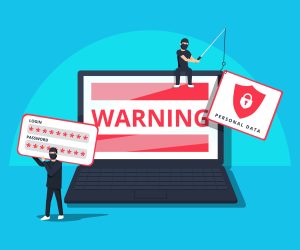Ransomware attacks have become one of the most common types of cybercrime aimed at enterprises, local authorities and educational institutions here in the UK. Government ministers have been outspoken on the topic, stating that ransomware is now the greatest cyberthreat in Britain.
A successful ransomware attack can be devastating to victims. At minimum, an attack can cause chaos for a company, but in worst-case scenarios, it can lead to expensive data breaches, loss of productivity and profitability, and harm to customers, employees and a firm’s reputation.
In this article, we’ll outline some important points that every firm should understand about ransomware attacks.
How ransomware attacks start
While attacks can be launched in many ways, the most common attack vector for this type of cybercrime is via phishing messages. Malicious emails are sent to employees that include attachments and links engineered to download ransomware payloads. To protect your company, train your staff to spot phishing emails and ensure that they never engage with messages from unknown or suspicious senders.
What is double extortion?
Ransomware attackers of the past would simply lock users out of their private data and systems and demand a payment to release them. However, many firms became wise to this tactic and began keeping regimented backups. When attackers struck, they could simply upload a fresh and up-to-date copy of all their files, apps and systems and return to normal operations.
In reaction, ransomware attackers adopted double extortion as a strategy. When infiltrating a firm’s systems, the attackers locate sensitive files and steal them to use as leverage. If a victim refuses to pay, the attackers threaten them with disclosing the private data.
Paying ransoms is no guarantee of data security
As soon as a ransomware operator has penetrated a company’s systems, if the information retained on servers and devices is not properly protected, a data breach has occurred. Even if a company acquiesces and pays a ransom, they can never be sure that their data will be returned to them safely and, even if it is, they cannot guarantee it has not been shared with others. As a result, the UK government, the National Cyber Security Centre (NCSC) and the Information Commissioner’s Office (ICO) have all urged companies never to comply with criminals and pay ransoms.
Encryption software can keep your data safe
By far, the best method of securing the data your firm stores, shares and uses is to protect it with encryption software. Once a data file or email has been encrypted, a ransomware operator will no longer be able to simply view it, alter it or steal it.
At Galaxkey, we have developed a three-layer encryption software that offers first-class protection to documents of unlimited file size, as well as emails and their attachments. Approved by the NCSC, our data security solution is an ideal option for companies keen to combat a ransomware attack while remaining compliant with the UK’s General Data Protection Regulation (GDPR).
Contact us now for a free, two-week trial.



